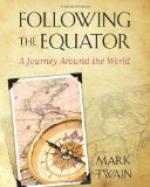When India is mentioned to the citizen of a far country it suggests Clive, Hastings, the Mutiny, Kipling, and a number of other great events; and the mention of Calcutta infallibly brings up the Black Hole. And so, when that citizen finds himself in the capital of India he goes first of all to see the Black Hole of Calcutta—and is disappointed.
The Black Hole was not preserved; it is gone, long, long ago. It is strange. Just as it stood, it was itself a monument; a ready-made one. It was finished, it was complete, its materials were strong and lasting, it needed no furbishing up, no repairs; it merely needed to be let alone. It was the first brick, the Foundation Stone, upon which was reared a mighty Empire—the Indian Empire of Great Britain. It was the ghastly episode of the Black Hole that maddened the British and brought Clive, that young military marvel, raging up from Madras; it was the seed from which sprung Plassey; and it was that extraordinary battle, whose like had not been seen in the earth since Agincourt, that laid deep and strong the foundations of England’s colossal Indian sovereignty.
And yet within the time of men who still live, the Black Hole was torn down and thrown away as carelessly as if its bricks were common clay, not ingots of historic gold. There is no accounting for human beings.
The supposed site of the Black Hole is marked by an engraved plate. I saw that; and better that than nothing. The Black Hole was a prison—a cell is nearer the right word—eighteen feet square, the dimensions of an ordinary bedchamber; and into this place the victorious Nabob of Bengal packed 146 of his English prisoners. There was hardly standing room for them; scarcely a breath of air was to be got; the time was night, the weather sweltering hot. Before the dawn came, the captives were all dead but twenty-three. Mr. Holwell’s long account of the awful episode was familiar to the world a hundred years ago, but one seldom sees in print even an extract from it in our day. Among the striking things in it is this. Mr. Holwell, perishing with thirst, kept himself alive by sucking the perspiration from his sleeves. It gives one a vivid idea of the situation. He presently found that while he was busy drawing life from one of his sleeves a young English gentleman was stealing supplies from the other one. Holwell was an unselfish man, a man of the most generous impulses; he lived and died famous for these fine and rare qualities; yet when he found out what was happening to that unwatched sleeve, he took the precaution to suck that one dry first. The miseries of the Black Hole were able to change even a nature like his. But that young gentleman was one of the twenty-three survivors, and he said it was the stolen perspiration that saved his life. From the middle of Mr. Holwell’s narrative I will make a brief excerpt:




